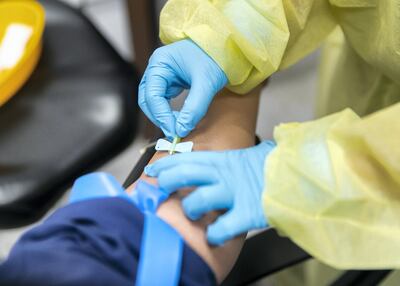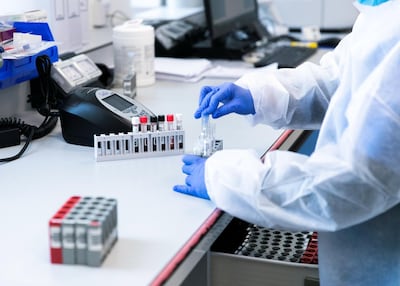Related: Covid-19 antibody test in UAE: should you get it?
New antibody blood tests that can tell if someone has previously had Covid-19 should be approached with caution, employers said.
The warning came after one Dubai business said two employees suspected of being potential carriers were given the wrong test after visiting Mediclinic Dubai Mall.
Rather than a commonly used PCR test, or nasal swab, to detect the virus both were offered an antibody finger prick test instead, without medical consultation.
Antibodies would only show in blood after at least seven days of contracting the virus, whereas the couple had been in contact with another virus carrier just 48 hours earlier.
Mediclinic has apologised for the error and changed wording on its advertising to make it clearer who is suitable for the Dh275 test.
“Most people are not prepared or fully informed about the kind of testing they need, so they rely on accurate information from hospitals,” said Euan Megson, managing director of Action Global Communications, who sent two employees for testing on June 16.
“Medical professionals should be asking questions as part of their duty of care, not because this is a commercial exercise that is tapping into people’s fears.
“They are doing pointless tests on those who may have passed through a temperature scanner okay, recorded a negative antibody test but could still be carrying the virus.”
As more staff return to workplaces and proof of a clean bill of health is needed for people to travel, antibody tests are growing increasingly popular in the UAE.
While the test is designed to tell if the patient has ever had Covid-19 and has developed viral antibodies, it is not the most effective way of finding out if someone currently has the disease.
The company chose Mediclinic to test staff as the hospital had advertised an FDA-approved Sars-CoV-2 IgG Antibody Test for walk-in patients promising rapid results.
The test was not covered by health insurance and advertising material said it was most effective at least a week after onset of symptoms.
Negative results on both samples were returned within 24 hours, but company management insisted the pair take a second nasal swab – the more recognised PCR test.
While that also showed neither had the virus, the initial test’s inconclusive results had placed others at potential risk, they said.
One of those tested said staff failed to ask important questions that could have directed them towards a more suitable nasal swab.
“I was showing no virus symptoms and it was still too early for the antibody test,” said the employee who preferred not to be named.
“The nurse said there were so many people getting the antibody screening, which is alarming as not everyone will know what they are getting.”
Mediclinic said a statement on its website that said antibody tests would be given only after seeing a doctor was an error and has since been rectified.
"It is possible for a patient to walk in, ask for the test and be given it on the spot but in this case, the patient arrived at the clinic and requested an antibody test," said Vernon Cordy, clinic director at Mediclinic Dubai Mall.
"We have identified a gap is our internal processes that could have indicated the patient's need was for a PCR test and not an antibody test and used this experience as a learning opportunity to improve our processes.
"We do apologise for the inconvenience caused by this oversight and are more than happy to carry out the correct Covid-19 PCR test free of charge should the patient still require it.”
Two tests are available to take in the UAE: the standard PCR nasal swab and the antibody test.
So far, nearly 3.5 million people have been tested across the UAE using the PCR nasal swab method.
As the pandemic migrates to the next stage of control measures, antibody tests are being increasingly used to reveal those with likely immunity.
Nearly all otherwise healthy individuals will develop an immune response following infection.
Hospitals said rapid results will help in the redeployment of front-line staff in service sectors like healthcare, airlines, malls and restaurants.
Coronavirus outbreak
Returning UAE residents need to show Covid-free certificate before boarding flights
UAE rolls out new testing kit to detect Covid-19 antibodies
Other healthcare groups, including Aster DM Healthcare, have also begun antibody testing with clinics charging Dh150 per test while NMC Specialty Hospital in Al Ain charges Dh250 for a consultation and test.
“The antibody test is useful in various settings,” said Dr Suneet Kaur head of pathology at NMC Specialty Hospital Al Ain.
“It may be used to confirm a diagnosis in people who have suspected Covid-19 but have tested negative on a standard PCR test or who have recently contracted the virus.
“A positive SARS-Cov-2 IgG antibodies test indicates with high certainty the person has been exposed and more likely to have immunity than another person with a negative results for the same test.”





